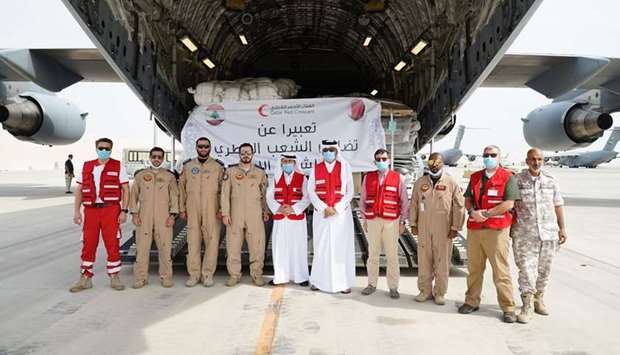During 2020, Qatar Red Crescent Society (QRCS) redoubled its efforts to combat the coronavirus (Covid-19) pandemic, mobilising all its resources to relieve the socioeconomic and health impacts on the vulnerable groups in Qatar and around the world.
QRCS intensified its medical, social, protective, informative, and voluntary activities locally and, at the same time, worked with fellow National Societies National Societies in many host countries to protect their people against the outbreak.
In its capacity as a humanitarian auxiliary to the State of Qatar and an active member of the International Red Cross and Red Crescent Movement, QRCS carried out many relief interventions in response to natural disasters in Lebanon, Sudan, and the Philippines, among others. It continued to back sustainable development plans at the host communities and had strong presence on the humanitarian diplomacy and advocacy front.
The year concluded in an ideal way. For the first time, QRCS took part in the Qatar National Day parade, in front of the leaders and top figures of the country. This historic moment brought a lot of honor to the medical professionals, volunteers, and relief workers from QRCS who showed up at the parade. It was in recognition to their heroic achievements, dedication, and national loyalty, being in the frontline with other organisations in the country.
According to initial reports, the number of beneficiaries from QRCS’s local development and volunteering activities exceeded 111,160 vulnerable persons, including widows, orphans, patients, older persons, school students, and many others. At a total cost of QR 19,272,490, this area can be divided into three categories: social care, community development, and the Al-Khor Branch.
As to Medical Services, QRCS deployed its medical professionals everywhere to serve the patients at health centers, quarantine facilities, and outdoor service centers. Health educators delivered face-to-face and online lectures/courses, amid full preventive measures.
In total, these services were provided for 1,433,083 persons, at a cost of QR 404,462,858. QRCS’s Medical Affairs Division works in collaboration with the Ministry of Public Health (MOPH), Hamad Medical Corporation (HMC), and Primary Health Care Corporation (PHCC). The services are: emergency medical services (EMS), community health training, Workers’ Health Centres, and Mekaines Quarantine Facility.
Internationally, QRCS expanded its outreach to new countries, in response to the Coronavirus pandemic. Its relief and development operations went on normally for the victims of conflict and natural disasters. It delivered QR 139,714,612 worth of humanitarian aid to 4,975,918 refugees, internally displaced persons (IDPs), and poor people in 33 countries (Palestine, Yemen, Afghanistan, Bangladesh, Nepal, Jordan, Iraq, Syria, Lebanon, Sudan, Somalia, Ethiopia, Indonesia, Mali, Kenya, Mauritania, Tajikistan, Kyrgyzstan, Kosovo, Pakistan, Albania, Montenegro, Sri Lanka, Uganda, Peru, El Salvador, Panama, Laos, Mongolia, Sierra Leone, Senegal, Vanuatu, and Venezuela).
A largescale international relief initiative was launched to help National Societies in 22 countries across six continents to fight the virus. A budget of QR 2,236,827 was allocated for the scheme, which was implemented directly by QRCS’s foreign representation offices and missions in some countries, and in cooperation with the host fellow National Societies in others.
There were seasonal campaigns such as the Ramadan Campaign, Adahi Campaign, and Warm Winter Campaign. In relation to emergency relief interventions, QRCS’s humanitarian providers were there to help the populations affected by the Beirut Harbor explosion in Lebanon, flash floods in Sudan, and Typhoon Vamco in the Philippines, just to name a few. Many of these operations were funded by Qatar Fund for Development (QFFD).

